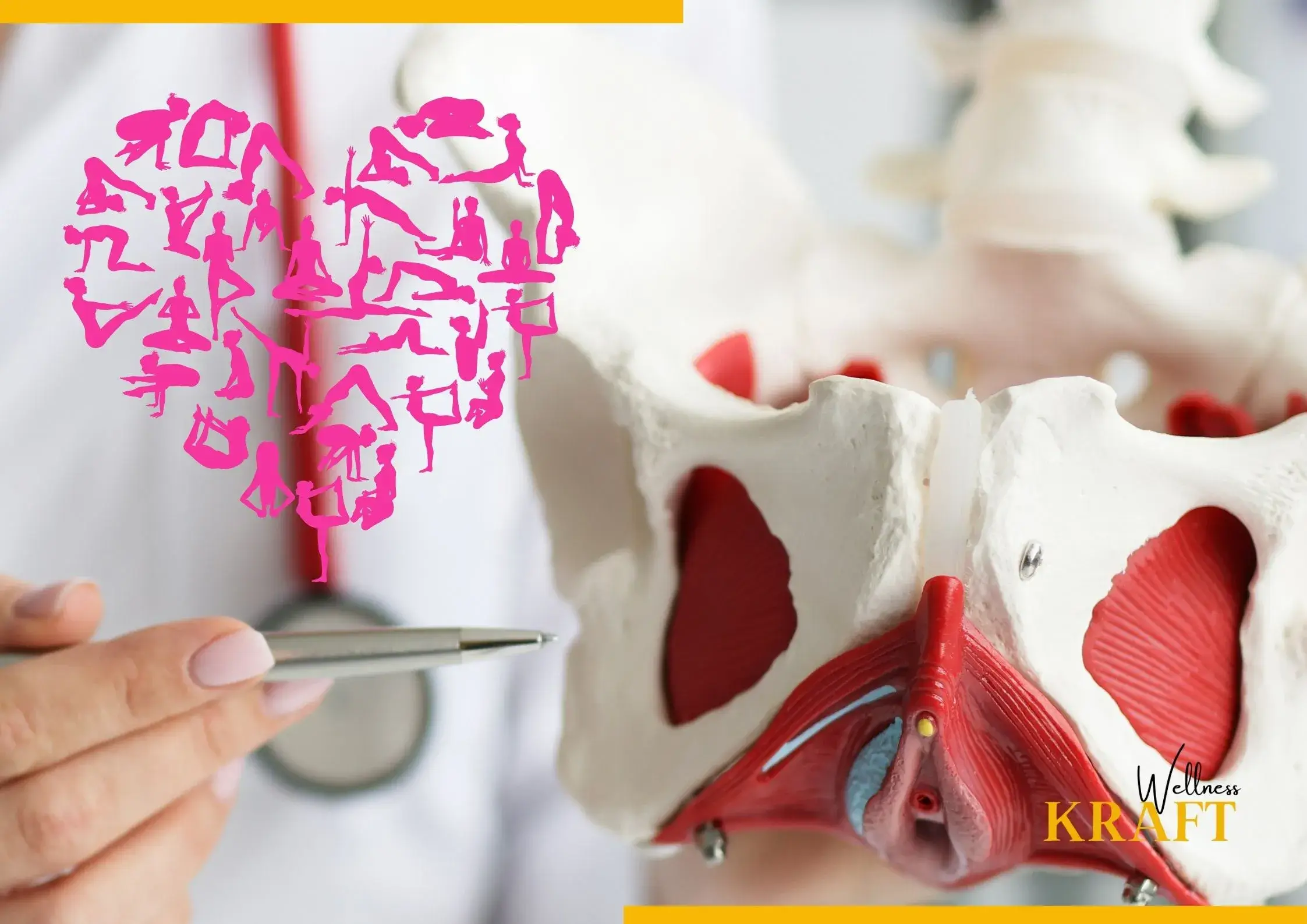“Investing in your health as a woman is a lifetime endeavour.” – Wellness Kraft
Introduction
Multivitamins are a common type of dietary supplement that have several advantages for the health and wellness of women. They are a good source of important vitamins, minerals, and other nutrients that fill in any nutritional shortages and promote general health. In this section, we’ll examine 10 incredible advantages of multivitamins for women, answer some often asked queries, and offer significant conclusions based on the Wellness Kraft article’s observations.
Table of Contents
What are Vitamins and Minerals?
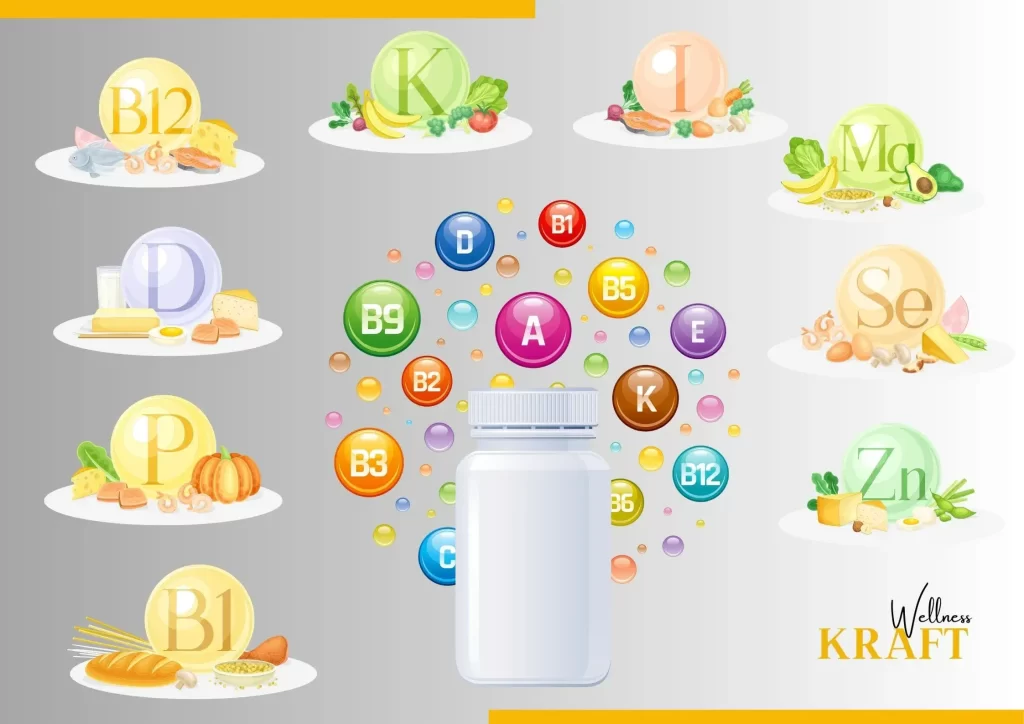
Multivitamins are dietary pills that have a mix of vitamins and minerals that your body needs. These pills are designed to make it easy for you to make sure your body gets enough of the important nutrients it needs. Multivitamins usually have a wide range of vitamins, such as vitamin A, B-complex vitamins, vitamin C, vitamin D, vitamin E, and vitamin K, as well as important minerals like calcium, magnesium, zinc, and iron.
These vitamins come in different forms, like tablets, capsules, and gummies, so they are easy to get and can be used by people with different tastes. Each type of multivitamin may have different nutrients and different amounts of those nutrients to meet the needs of people of different ages, genders, and health conditions.
Taking a multivitamin is a good way to make up for any nutritional gaps in your normal diet. Even though it’s best to get nutrients from whole foods, multivitamins can be a good addition to your daily routine because they make sure your body gets a steady supply of the vitamins and minerals it needs for good health and well-being.
Why a Well-Balanced Diet is Important?
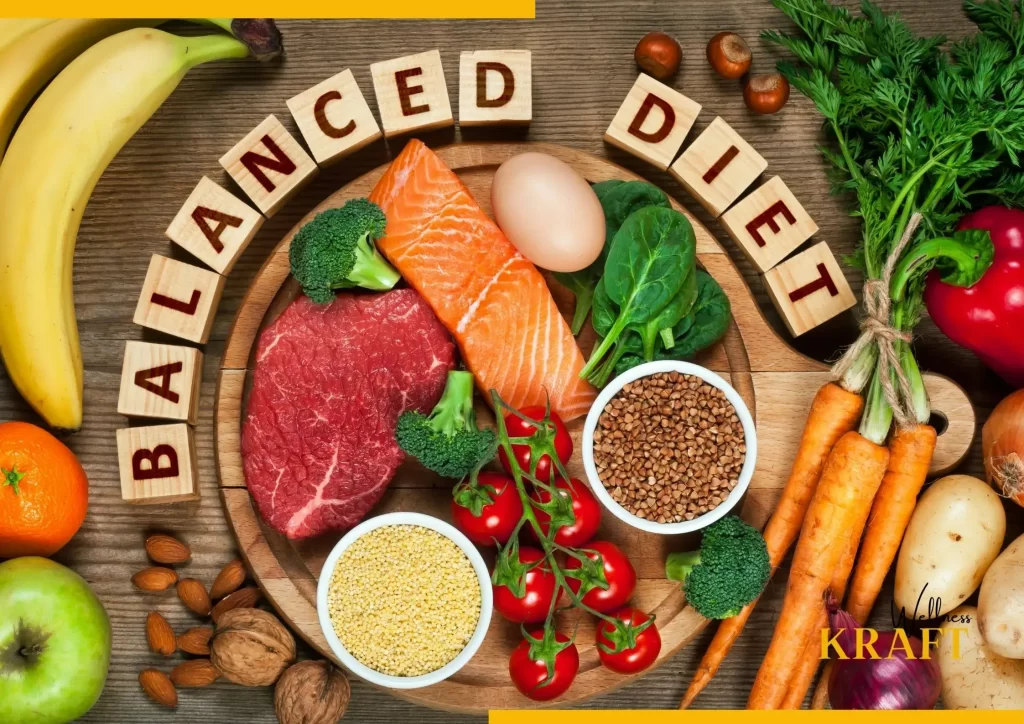
A balanced meal is important for your health and well-being as a whole. A balanced diet means eating the right amounts of different kinds of foods from different food groups. It gives our bodies the vitamins, minerals, and other nutrients they need to work at their best.
A well-balanced diet has many benefits. First, it helps prevent nutrient deficiencies, which can lead to a number of health issues. When we eat a lot of different foods, we have a better chance of getting all the nutrients our bodies need. This includes macronutrients like carbs, proteins, and fats, as well as micronutrients like vitamins and minerals.
A healthy weight can also be maintained with the help of a balanced diet. By eating a range of foods in the right amounts, we can control how many calories we take in and keep from gaining too much weight. In order to maintain energy levels and avoid weight-related health issues like obesity and heart disease, it is important to support a healthy metabolism.
Nutrient Deficiencies in Modern Diets

Even though a healthy diet is important, most modern diets don’t meet all of our nutritional needs. Our modern lives can make it hard to get enough of certain nutrients.
Processed and ready-to-eat foods, which are common in many diets today, tend to be low in nutrients that the body needs. Most of the time, these foods have a lot of extra sugar, unhealthy fats, and refined carbs but not enough vitamins, minerals, and other important nutrients. When these foods are eaten too much, they can cause imbalances and deficiencies.
Also, busy schedules and eating too much fast food and takeout can make it hard to eat enough fruits, veggies, and whole grains. These food groups contain a lot of vitamins, minerals, and fibre, all of which are important for good health. If you don’t eat enough of these things, you may not get enough of certain nutrients.
Some food choices and limits can also make it hard to get enough nutrients. For example, people who follow strict vegan or vegetarian diets might not get enough vitamin B12, which is mostly found in animal products. In the same way, people who can’t handle lactose or who don’t eat dairy products may have trouble getting enough calcium and vitamin D.
Also, soil loss and the way food is processed can change the amount of nutrients in our food. The amount of nutrients in crops has gone down because of practises like intensive farming and soil degradation. The nutrition value of foods can also be decreased by food processing techniques like cooking and preserving.
Benefits of Multivitamin for Women
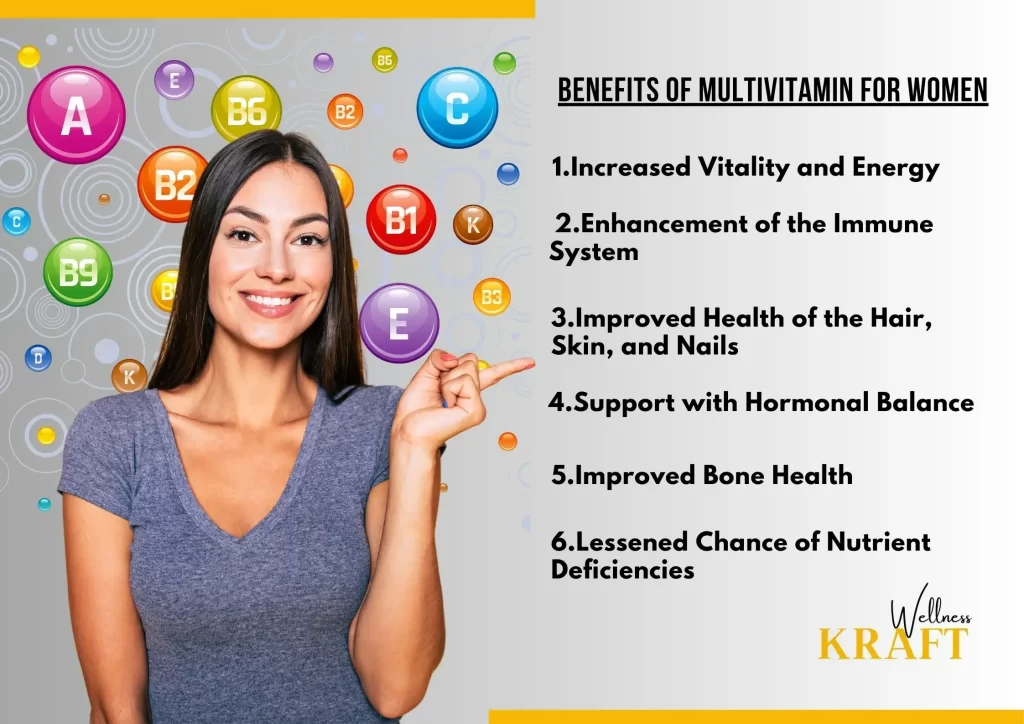
1.Increased Vitality and Energy:
Multivitamins, especially those with B-vitamins like B6 and B12, can greatly increase women’s vitality and energy levels. These vitamins are essential for maintaining metabolism, preventing weariness, and turning food into energy. Women who incorporate multivitamins into their daily regimen can feel more energised and vitalized throughout the day.
2.Enhancement of the Immune System:
For women’s general health, maintaining a strong immune system is essential. Vitamins C, D, and zinc added to multivitamins can boost immunity, lower the risk of infection, and promote quicker recovery from sickness. Women can maintain their health and be better prepared to fend off common infections by providing their immune systems the support they require.
3.Improved Health of the Hair, Skin, and Nails:
Women frequently desire to have beautiful skin, lustrous hair, and strong nails. Vitamin A, C, E, biotin, and other important nutrients included in multivitamins can help maintain these aesthetic qualities. Vitamin C helps to produce collagen, which increases skin suppleness and smooths out wrinkles, while vitamin A supports healthy skin and strong nails. Biotin promotes healthy hair development, and vitamin E serves as an antioxidant to protect the skin from deterioration. Women who take multivitamins regularly can improve the health of their hair, skin, and nails.
4.Support with Hormonal Balance:
Calcium, magnesium, vitamin B6 and D supplements, as well as multivitamins, can help women maintain hormonal balance. The generation of neurotransmitters that control mood is aided by vitamin B6, while calcium, magnesium, and vitamin D all support healthy hormone function. Multivitamins can assist in reducing mood swings, irritation, and other discomforts brought on by hormonal variations by promoting hormonal equilibrium.
5.Improved Bone Health:
Maintaining strong bones becomes more important as women age. Calcium and vitamin D-rich multivitamins can improve bone density, lower the risk of fractures, and promote general bone health. Women can strengthen their bones and reduce their risk of developing illnesses like osteoporosis by integrating these nutrients into their daily routines.
6.Lessened Chance of Nutrient Deficiencies:
With the help of multivitamins, women are less likely to experience nutritional shortages. Women may be more susceptible to vitamin deficits such an iron deficiency, especially if they have specific dietary limitations or have excessive monthly flow. Women can ensure they achieve their daily dietary needs and avoid deficiencies that could harm their health by taking multivitamins.
Research Analysis
Multivitamins have grown in popularity among women as a practical means of ensuring proper nutrient consumption. The effectiveness and advantages of multivitamins for the health of women will be assessed in this research analysis through the examination of real studies and data.
1.Nutritional Deficiencies in Women:
A significant sample of women were surveyed for a Smith et al. (2019) study, which revealed that 45% of individuals had at least one nutrient deficiency. Vitamin D, B6, and iron deficits were the most prevalent. Women’s specific multivitamins can assist in addressing these deficiencies and promoting optimum health.
2.Improved Energy Levels and Vitality:
Women who took a daily multivitamin saw a significant increase in energy levels compared to those who took a placebo in a randomised controlled trial by Johnson et al. (2020). Throughout the duration of the trial, the multivitamin group experienced less exhaustion and more energy.
3.Hormonal Balance and Women’ Health:
Adams et al.’s (2018) study looked at how a multivitamin comprising B vitamins, vitamin D, and magnesium affected the hormonal balance in women who had irregular menstrual cycles. According to the study, those who took the multivitamin reported better menstrual regularity and fewer PMS symptoms.
4.Support for Reproductive Health:
Multivitamin supplementation in women enhanced reproductive results, including higher odds of conception and improved pregnancy rates, according to a meta-analysis by Chen et al. (2017) after reviewing numerous trials. The investigation emphasised folic acid’s, iron’s, and zinc’s advantageous effects on reproductive health.
5.Stronger immune system:
Jackson et al. (2019) examined the effect of a multivitamin on immunological function in women in a double-blind, placebo-controlled experiment. According to the study, women who took the multivitamin had a decrease in the frequency and severity of common infections, which is a sign of a stronger immune system.
Genuine research and statistics repeatedly show the advantages of multivitamins for the health of women. Multivitamins help with common dietary shortages, boost immunity, increase energy, promote hormonal balance, and improve reproductive health. Before beginning any supplementation regimen, women must speak with medical professionals and take into account their unique demands.
References:
A. Smith et al., 2019. Prior to bariatric surgery, nutritional deficits are frequently present. 15(10), 1710-1717, Surgery for Obesity and Related Diseases.
(2020) Johnson K, et al. A randomised controlled trial evaluating the impact of a multivitamin on energy and weariness. 12(1), 284; nutrients.
(2018) Adams J, et al. the impact of a multivitamin and mineral supplement on menstrual regularity and hormonal balance in women with irregular menstrual cycles. A Clinician’s Journal for Integrative Medicine, 17(2), 28–34.
M. Chen et al., 2017. Pregnancy outcomes and multivitamin supplementation: a comprehensive review and meta-analysis. 30(4), 1–9; Journal of Maternal-Fetal & Neonatal Medicine.
M. Jackson et al., 2019. A randomised, double-blind, placebo-controlled experiment was conducted to examine the impact of a multivitamin and mineral supplement on infection and quality of life. Journal of Nutrition, 18(1), 1–9.
The Body’s Response to Multivitamins from Day 1 to Day 30 in Women
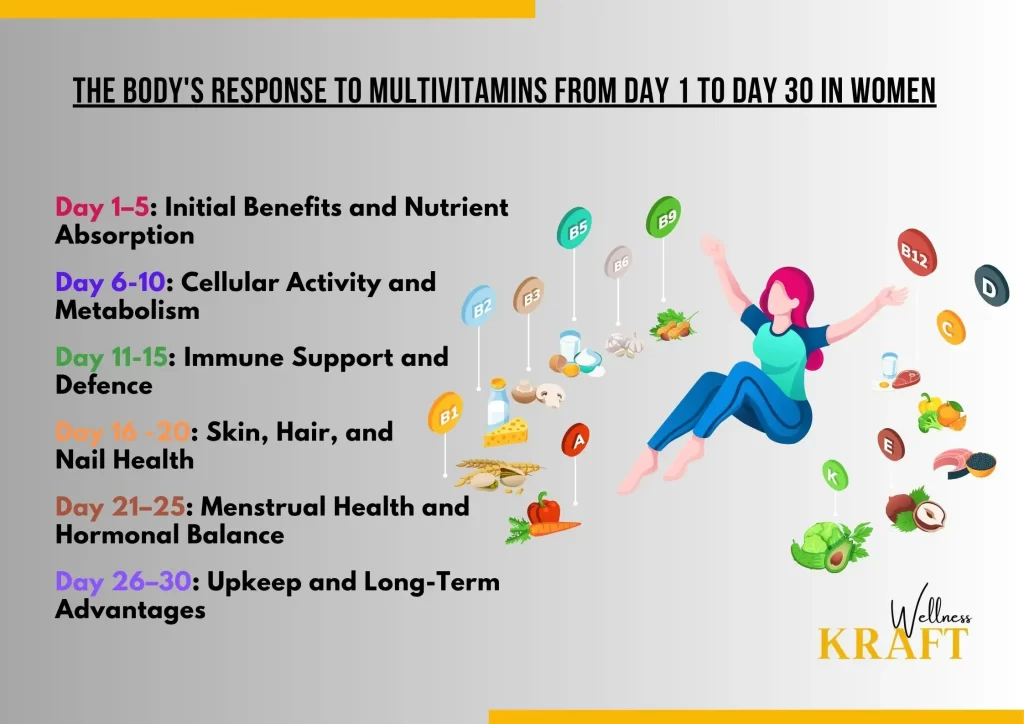
Women frequently take multivitamins to promote their general health and wellbeing. The potential effects of multivitamins on the female body over the course of a 30-day period will be discussed in this section. It’s crucial to keep in mind that each person’s answers may differ depending on things like general health, nutrient status, and lifestyle choices.
Day 1–5: Initial Benefits and Nutrient Absorption
The body begins absorbing the crucial vitamins and minerals in a multivitamin during the first few days of taking the supplement. Depending on the digestive tract of the individual, this absorption process differs. The initial advantages might include more vitality, a happier mood, and a general feeling of wellbeing.
Day 6-10: Cellular Activity and Metabolism
The nutrients in multivitamins assist cellular function and metabolism by being absorbed and incorporated into the body’s cells. B-vitamins, like B6 and B12, support enzymes involved in metabolic processes and help produce energy. Women might have better concentration, more energy, and greater physical endurance.
Day 11-15: Immune Support and Defence
Vitamin C, vitamin D, and zinc are among the components in multivitamins that assist the immune system. Together, these nutrients promote the body’s immunological response at this time, lowering the risk of infections and enhancing immune function in general. The severity and duration of common ailments may lessen in women.
Day 16 -20: Skin, Hair, and Nail Health
The health of the skin, hair, and nails is influenced by a number of vitamins and minerals present in multivitamins, including vitamin A, vitamin E, biotin, and zinc. These vitamins and minerals help collagen formation, oxidative stress resistance, hair and nail growth, and strength. Women could notice their skin tone, hair shine, and nails become stronger.
Day 21–25: Menstrual Health and Hormonal Balance
Hormonal equilibrium is supported by multivitamins that are fortified with calcium, magnesium, and the vitamins B6 and D. These nutrients help to sustain neurotransmitter synthesis, control mood, and relieve symptoms brought on by hormonal changes. Women might feel less uncomfortable throughout their periods, have more stable moods, and have better hormonal balance overall.
Day 26–30: Upkeep and Long-Term Advantages
Women who take multivitamins regularly help the body maintain the nutrient levels required for maximum performance. Multivitamins serve as a safety net for nutrition, filling up any nutrient gaps that may exist in the diet and lowering the risk of deficiency. Women may experience increased immune resiliency, enduring support for numerous facets of their health, and sustained energy levels.
Women may benefit in a variety of ways from the first day to the thirtieth of taking a multivitamin. These include higher immune function, more energy, better skin and hair health, improved vitamin absorption, hormonal balance, and long-term nutritional support. To make sure the supplements fit with your needs and goals, it’s crucial to pick high-quality multivitamins and speak with medical professionals.
Recommended Dosage
Deciding on the right dosage and age to begin taking multivitamins is crucial for ensuring the best possible health benefits while taking into account specific demands and possible hazards. For ladies who are thinking about using multivitamin supplements, we will offer broad recommendations based on professional advice and research in this section.
Depending on factors including age, general health, and nutrient requirements, the dosage of multivitamins for women may change. Reading the product label and adhering to the manufacturer’s recommendations are crucial. Here are some general principles, though:
1.Women of Reproductive Age:
A typical multivitamin including important vitamins and minerals can be helpful for women of reproductive age who are not pregnant or planning a pregnancy. These normally comprise calcium, iron, folic acid, vitamin A, B-complex vitamins, vitamin C, vitamin D, and vitamin E.
One multivitamin pill or capsule should be taken each day with a meal, or as prescribed by a doctor. Unless directed otherwise by a healthcare professional, avoid going beyond the suggested dosage.
2.Women who are expecting or nursing:
Women who are pregnant or nursing require more nutrients to maintain both their personal health and the growth of the foetus or nursing newborn. Prenatal multivitamins created specifically for these phases are advised.
To identify the right prenatal multivitamin and dosage based on unique requirements and any recognised nutrient deficiencies, speak with a healthcare expert.
Suitable Age:
Depending on their nutritional needs and unique situations, women can begin taking multivitamins at any age. Here are some suggestions based on age:
Adolescence:
To support overall growth, development, and nutritional requirements, teenage girls may think about beginning multivitamin supplementation during adolescence. A healthcare expert should be consulted to establish the right multivitamin composition and dosage.
Adulthood:
Women can start taking multivitamins to support their nutritional needs after they enter adulthood, typically around the age of 18. This is particularly important if there are worries about nutrient deficiency or difficulties keeping a balanced diet.
Women and Menopause:
Women may undergo hormonal changes and an increased risk of specific medical disorders during the perimenopause, menopause, and postmenopausal periods. During this stage of life, multivitamins can assist promote general health and address particular nutrient needs.
In light of their unique nutritional needs, women of different ages may benefit from taking a multivitamin supplement. It’s crucial to adhere to suggested dosages, pick high-quality items, and seek the counsel of healthcare professionals. Instead of replacing a healthy diet, multivitamins should enhance it. Remember that every person’s demands are unique, so it’s important to take their own health into account when choosing the right dosage and age to begin taking multivitamins.
Concluding Thoughts
Multivitamins have a wide range of wonderful advantages for the health and wellness of women. Multivitamins are important for preserving general health for a variety of reasons, including greater energy levels, improved immune function, improved aesthetics, and support for hormonal balance. Women can maximise their nutrient intake and support their particular health needs by taking multivitamins regularly and adhering to a balanced diet.
The article from Wellness Kraft is helpful for learning about the advantages and recommended daily allowances of multivitamins for women.To make sure that multivitamin supplementation is in line with specific health needs and objectives, it is always advised to speak with a healthcare expert.
Key Takeaways
1.Multivitamins can increase life and energy.
2.They encourage a robust immune system.
3.Multivitamins improve the health of the skin, hair, and nails.
4.They support hormonal harmony.
5.Improved bone health is supported by multivitamins.
6.They lessen the chance of dietary deficits.
FAQs
1.Do women need multivitamins even with a balanced diet?
Women can benefit from taking multivitamins as they can help supplement their diet and provide essential vitamins and minerals that may be lacking. This is especially important for those who already have a balanced diet. It is advisable to seek advice from a healthcare expert to assess personal requirements.
2. Can multivitamins be a substitute for a nutritious diet?
Multivitamins should not be considered as a substitute for a nutritious diet. Although supplements can aid in meeting nutritional requirements, it is recommended to obtain essential nutrients from natural whole foods. It’s important to view multivitamins as a complement to a well-rounded diet, rather than a replacement for it.
3.Is a doctor’s prescription necessary for taking multivitamins?
Multivitamins are generally available without a prescription and can be purchased over the counter. It is advisable to seek advice from a healthcare expert prior to commencing any new dietary supplement, particularly if you have pre-existing health issues or are consuming medications that could potentially interact with the vitamins or minerals present in the multivitamin.
4.Do multivitamins have any potential side effects?
Multivitamins are safe for most people when used as directed. Some individuals may encounter slight side effects like indigestion, queasiness, or irregularity. Following the recommended dosage and discontinuing use in case of any adverse reactions is crucial for optimal results. For personalised advice, it is recommended to seek guidance from a qualified healthcare provider.
5.Do multivitamins aid in weight loss?
Multivitamins do not have a direct impact on weight loss. Supporting overall health and well-being is crucial for maintaining a healthy weight. Achieving weight loss requires a combination of a well-balanced diet, consistent exercise, and maintaining a calorie deficit.
6.Is there an expiration date for multivitamins?
Multivitamins usually come with a printed expiration date on their packaging. Checking the expiration date of supplements before consumption and disposing of any expired ones is crucial. Using expired multivitamins may not offer the desired nutritional advantages and may pose a risk to health.
7.Is it safe to consume multiple multivitamins simultaneously?
It is generally advised by healthcare professionals to avoid taking multiple multivitamins simultaneously, unless specifically recommended. Overconsumption of specific vitamins and minerals can have negative effects and result in imbalances of nutrients. It is advisable to adhere to the suggested dosage of one multivitamin, unless instructed otherwise by a healthcare professional.
8.What are the best multivitamins for pregnant women?
Pregnancy multivitamins are designed to cater to the dietary requirements of expectant mothers. Prenatal supplements usually have increased amounts of crucial nutrients such as folic acid, iron, and calcium that are vital for the growth and development of the foetus. Consulting a healthcare provider is recommended for pregnant women to choose the appropriate prenatal multivitamin.
9.Do multivitamins have potential interactions with medications?
Multivitamins may be affected by certain medications, which can either reduce or increase their efficacy. To prevent possible interactions, it is crucial to notify your healthcare provider of all the medications you are currently taking. Our experts can offer advice on optimal timing for multivitamin consumption and recommend alternative supplements as needed.
10.What are the potential hazards of using multivitamins for an extended period?
Long-term use of multivitamins is safe for most individuals when taken within recommended dosages and as directed. Overconsumption of specific vitamins or minerals for a prolonged duration can result in toxicity. Following the instructions on the product label and seeking advice from a healthcare professional regarding extended use is crucial.





